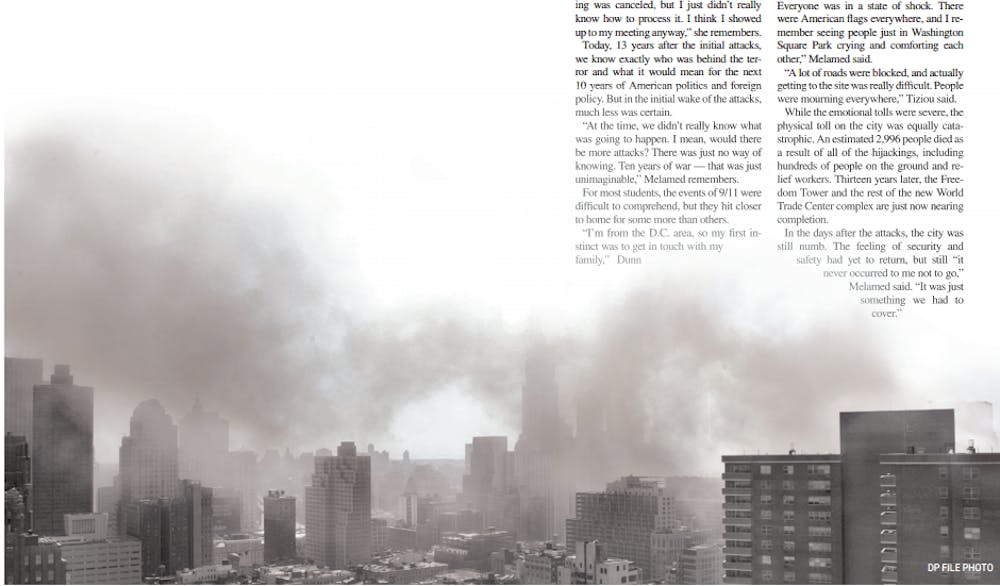
“ I thought it was a joke.”
“It just didn’t seem like it could possibly be real.”
But the attacks on the World Trade Center and the Pentagon on Sept. 11, 2001 were anything but a joke.
While New York and the rest of the country were sent into a fit of chaos and confusion, Penn’s campus reflected very much the same picture.
“I remember I was actually at the [Daily Pennsylvanian] office when I found out. I was doing something on the computer and someone from the photography department came in and told us a plane had just hit the World Trade Center. I don’t think I knew what to think when I heard him say that,” 2003 College graduate and former DP reporter Samantha Melamed said.
“A bunch of us were standing together watching the TV when the second plane hit, and then other reporters just started showing up. We all knew this was something we would need to cover,” she said. “I don’t think I immediately processed what had happened. I could see it on the TV, but really understanding what it meant — that took a while.”
Another DP alum, 2004 College graduate Marla Dunn remembers a similar sense of shock and confusion. “I remember I woke up early to meet with an administrator for a story I was working on, and I just remember hearing the news. Obviously my meeting was canceled, but I just didn’t really know how to process it. I think I showed up to my meeting anyway,” she remembers.
Today, 13 years after the initial attacks, we know exactly who was behind the terror and what it would mean for the next 10 years of American politics and foreign policy. But in the initial wake of the attacks, much less was certain.
“At the time, we didn’t really know what was going to happen. I mean, would there be more attacks? There was just no way of knowing. Ten years of war — that was just unimaginable,” Melamed remembers.
For most students, the events of 9/11 were difficult to comprehend, but they hit closer to home for some more than others.
“I’m from the D.C. area, so my first instinct was to get in touch with my family,” Dunn said.
In the immediate wake of the attacks, there was a definite feeling of concern on campus for the safety of the students, and for Philadelphia in general. However, as more time passed, the danger seemed less imminent.
“Once it was clear that there weren’t more planes flying into buildings, people started to calm down,” Melamed remembers.
In the days after 9/11, even local students in New York didn’t venture off their campuses. Still, just two days after the attacks, on September 13, 2001, Melamed and a team of other reporters and photographers from the DP took a train to New York to cover the scene on the ground.
“The first thing I remember is just taking the Amtrak up first thing in the morning and, as we got closer to the city, seeing the skyline without the World Trade Center. It was just so surreal,” Melamed said.a
2002 College graduate and former DP photographer Jacques-Jean Tiziou was with Melamed in New York that day.
“When we got there, memorials were already set up and people had started grieving. There was still this huge cloud of smoke and dust over the city two days later,” Tiziou said.
The atmosphere in the city was completely out of the ordinary.
“We got off the train at Penn Station, and it was just eerily quiet for New York. Everyone was in a state of shock. There were American flags everywhere, and I remember seeing people just in Washington Square Park crying and comforting each other,” Melamed said.
“A lot of roads were blocked, and actually getting to the site was really difficult. People were mourning everywhere,” Tiziou said.
While the emotional tolls were severe, the physical toll on the city was equally catastrophic. An estimated 2,996 people died as a result of all of the hijackings, including hundreds of people on the ground and relief workers. Thirteen years later, the Freedom Tower and the rest of the new World Trade Center complex are just now nearing completion.
In the days after the attacks, the city was still numb. The feeling of security and safety had yet to return, but still “it never occurred to me not to go,” Melamed said. “It was just something we had to cover.”
The Daily Pennsylvanian is an independent, student-run newspaper. Please consider making a donation to support the coverage that shapes the University. Your generosity ensures a future of strong journalism at Penn.
DonatePlease note All comments are eligible for publication in The Daily Pennsylvanian.





